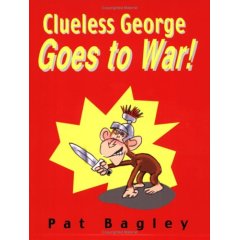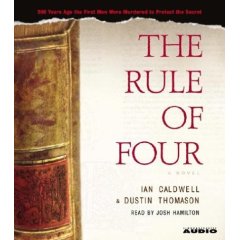
Good lord, I love this book. It is surely in the top three of my favorite historical romances
of all time, and it maybe, maybe is #1. Julie Garwood's
Ransom is still holding on tight, though.
I first read this book years ago, after reading quite a few of Ms. Woodiwiss's other works. Everytime I would read reviews on Amazon or a place like that, everyone mentioned
Shanna as one of their favorites, so I decided to give it a whirl. I can't remember how I felt about it back then, but after rereading it this weekend, me likes it.
Here's a plot synopsis: The book is set in the 1720's or '30's (I can't remember exactly when). Shanna is the daughter of a vastly wealthy merchant who lives on and serves as governor of a small Caribbean island where he grows sugar cane. Her father is a widower who dotes on his only child, but it is his mission in life to see her married and a mother. He wants grandchildren and he wants them now! Shanna was educated in Europe, but when she returns home after turning away dozens of would-be suitors, her father gets angry and gives her an ultimatum: She's to return to England for a year, and if in that year she doesn't find a man from a respectable family (with a good, aristocratic name), then he will find a husband for her.
Now, Shanna's not the kind of woman to be bossed around, especially when it comes to marriage. She's not only a renowned beauty, but is also the daughter of an obscenely wealthy man, so it's important to her that the man she ends up with loves her for her, and not because she's rich. And as a romantic, she has this ideal man in mind, a white knight who will ride up and save her from all her woes. Unfortunately for her, she's about a month from her deadline when she still hasn't found a man who fits the bill. Determined not to be bested by her father, she hatches a plan. She and her guardian/servant bride the gaoler at Newgate prison to show them the list of names from men condemned to die. When she sees the name Ruark Beauchamp, a condemned murderer, she decides that he will be the perfect husband. After all, the Marquess de Beauchamp is a well-known aristocrat in London, so her father will be well-pleased with the name. However, the prisoner is an American colonist who cannot be related to the powerful family, and he's destined to die in a matter of weeks! Shanna decides she will make a bargain with the man - his name in marriage for her money to make his last days more comfortable. The prisoner agrees, but he adds one condition - he gets a wedding night with his bride.
Shanna agrees because she's desperate, even though her new finance looks awful after three months in a dank cell. But more bribing of the gaoler and Shanna gets Ruark out of gaol for a day so that they can marry respectfully in a small country parish. Much to her surprise, her hubby cleans up quite nicely. Much to his surprise, Shanna has him thrown back in gaol before her part of the bargain is fulfilled, and then tells everyone that she was married and widowed within a week.
Not that the above is ridiculous enough on its own, but
it gets even better!!! Shanna's father's stewart (who knows nothing of her scheme) is in London with her, and on the day Ruark is to be executed, he goes to Newgate and purchases Ruark from the gaoler. He plans to take him back to Shanna's island and tell her father that he is a bondsman. Apparently it was common practice for Shanna's father to take in bondslaves and let them work off their debts on his island, but the stewart is going behind his back by getting felons and murderers from Newgate. So low and behold, when Shanna gets home to her father's island and tells everyone she's a widow, she's much surprised to see her supposedly dead husband there as a bondsman! Ruark is determined to get her to fulfill their bargain, but he keeps his identity underwraps while he establishes himself as the smartest, hardest working bondslave on the island.
There are many more unbelievable coincidences, but who really cares? It's a romance novel, and this novel is perfection.
I have deep, deep affection for romance novels written over twenty years ago, and since this one was written in 1977, it fits the bill. Plus, Woodiwiss's writing is so grandiose that it's just insanely entertaining. I loved Ruark, mainly because he took endless delight in baiting and teasing Shanna until she screamed at him in frustration and annoyance. And even though Shanna often acted like a spoiled brat, Ruark always called her on it, and Woodiwiss acknowledged it by making her eventually grow out of it. Some reviewers have little tolerance for Shanna's wishy-washiness with it came to Ruark, but I thought it was believable. She was a rich, spoiled woman, and she thought he was a poor, murdering colonial! (Although, it didn't take long to become clear from his character that Ruark was no murderer.) It doesn't surprise me that she didn't yield to him mind, body, and soul right away at the beginning. Instead, she gradually learned to let go of her ideals of the perfect man and accept Ruark despite his humble social status. I think it would have been unbelievable if Woodiwiss had her change everyone overnight.
Also, I disagree with one reviewer who said that there was nothing about Shanna for Ruark to be attracted to except her beauty. She was fiesty and yes, it often came across as bitchy, but I can see why it would interest Ruark. He'd tease and push at her, and she'd push right back! She was not boring or uninteresting in the least, and underneath it all she had a good heart. Of course a man would be facinating by a gorgeous, well-dressed woman who walks into his gaol cell and says she wants to marry him! That takes balls!
This book is painfully long, but it works because Shanna's character needs that much time to completely surrender to the fact that she is indeed married to Ruark. Even after she starts sleeping with him (initially because she feels guilty over cheating him of their bargain), she's still hesitant to admit she married a convincted murderer. I think that is utterly reasonable.
Anyhoo, there's more good stuff that happens at the end (and if you couldn't guess, Ruark really didn't kill anyone, and he's not a poor nobody, either). But my weakness for secret marriage plots, the epic saga-ness of it all, and the enjoyable characters makes this book so very, very fun for me to read. And wow, this was a long review for me.
Lindsey's Grade: A+
P.S. There are pirates, too!

 I am a big fan of all his books with central character Alex Cross; Kiss the Girls, Along Came a Spider, etc; but some of his very best work is when he branches out a bit and introduces new faces; Beach Road, Beach House, Jester and Honeymoon were all excellent
I am a big fan of all his books with central character Alex Cross; Kiss the Girls, Along Came a Spider, etc; but some of his very best work is when he branches out a bit and introduces new faces; Beach Road, Beach House, Jester and Honeymoon were all excellent















